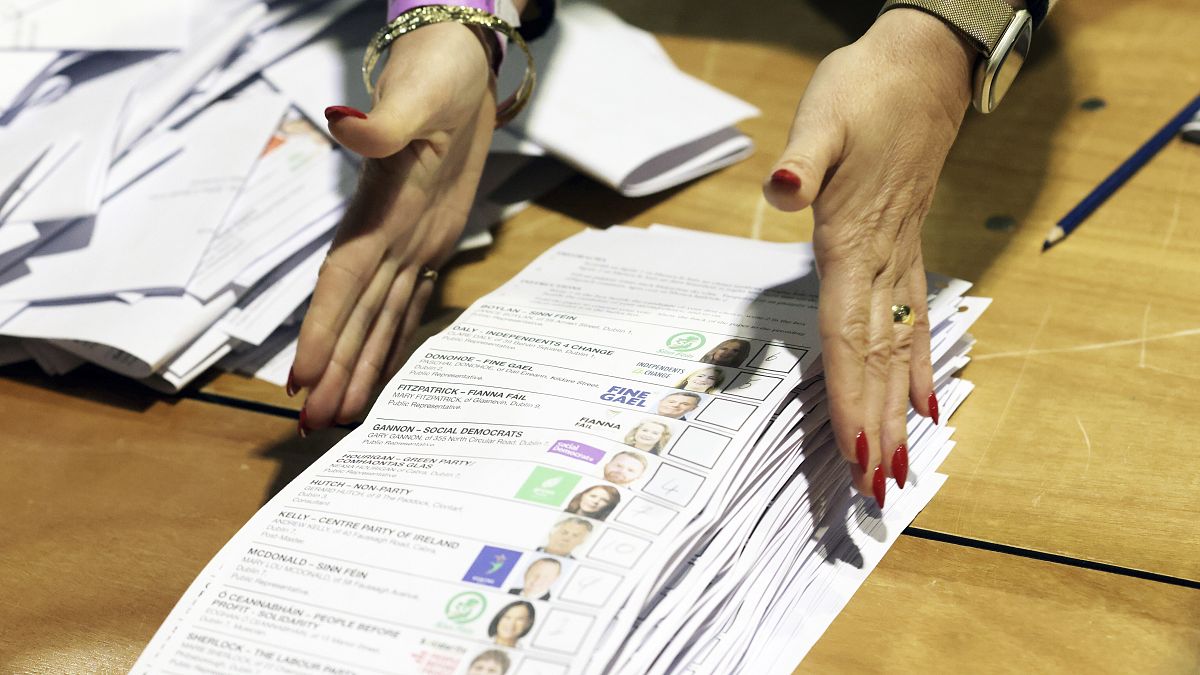The results of the election mean Ireland has partly bucked the global trend of incumbents being rejected by disgruntled voters after years of pandemic measures, international instability and cost-of-living pressures.
Ireland’s two dominant centre-right parties look likely to form the country’s next government as the final results from a fractured national election trickle in.
But both Fine Gael and Fianna Fáil, part of the incumbent governing coalition, took a reduced vote share and face complex coalition negotiations to put the new administration together.
Public broadcaster RTÉ reports 153 seats in the 174-seat lower house of parliament, the Dáil, have been called. Fianna Fáil have taken 40 with Fine Gael winning 33.
“I think there is a very clear route back to government although it’s not fully determined because a lot will depend on those final seats that I have spoken about,” said Fianna Fáil leader, Micheál Martin.
In second place is the left-of-centre Sinn Féin with 34 seats, but it may struggle to find partners willing to form a coalition with it.
Both Fianna Fáil and Fine Gael have previously said they wouldn’t work with the party, citing its leftist policies and historic links with the militant Irish Republican Army (IRA).
“We understand that that vote was for change, for a change in government and I and we will do everything that we can once the voting is finished and the seats are filled to pursue that goal,” Mary Lou McDonald, the leader of Sinn Féin said.
What is almost certain is that no single party will have enough seats to govern on its own and the most likely outcome is a coalition between Fianna Fáil, and Fine Gael under outgoing Prime Minister Simon Harris.
In that case either Harris or Martin or possibly both, if they strike a job-sharing deal, will become Ireland’s next PM, known as the Taoiseach.
“I think anybody who makes any prediction about who is going to be the largest party or the construct of the next government is a braver person than I am,” said Fine Gael leader and incumbent Taoiseach, Simon Harris.
“But what I am very confident about is that my party will have a very significant role to play in the years ahead and I am cautiously optimistic and excited about what the weeks ahead hold.”
Ireland uses a complex system of proportional representation in which each of the country’s 43 constituencies elects several lawmakers and voters rank candidates in order of preference.
As a result, it can take days or even weeks for full results to be known.
The cost of living and Ireland’s acute housing crisis were dominant topics in the three-week election campaign, alongside immigration, which has become a challenging issue in the country of 5.4 million people.
The results of the election mean Ireland has partly bucked the global trend of incumbents being rejected by disgruntled voters after years of pandemic, international instability and cost-of-living pressures.
The next government, like the last, will likely be led by two parties that have dominated Irish politics for the past century.
Fine Gael and Fianna Fáil have similar policies, but are long-time rivals with origins on opposing sides of Ireland’s 1920s civil war.
After the 2020 election ended in a virtual dead heat, they formed a coalition, propped up by the Green Party.
The Greens had a devastating result, losing all but one of their 12 seats.
This time, the winning parties may turn to left-leaning Labour or the Social Democrats, or to independent lawmakers, for support.

